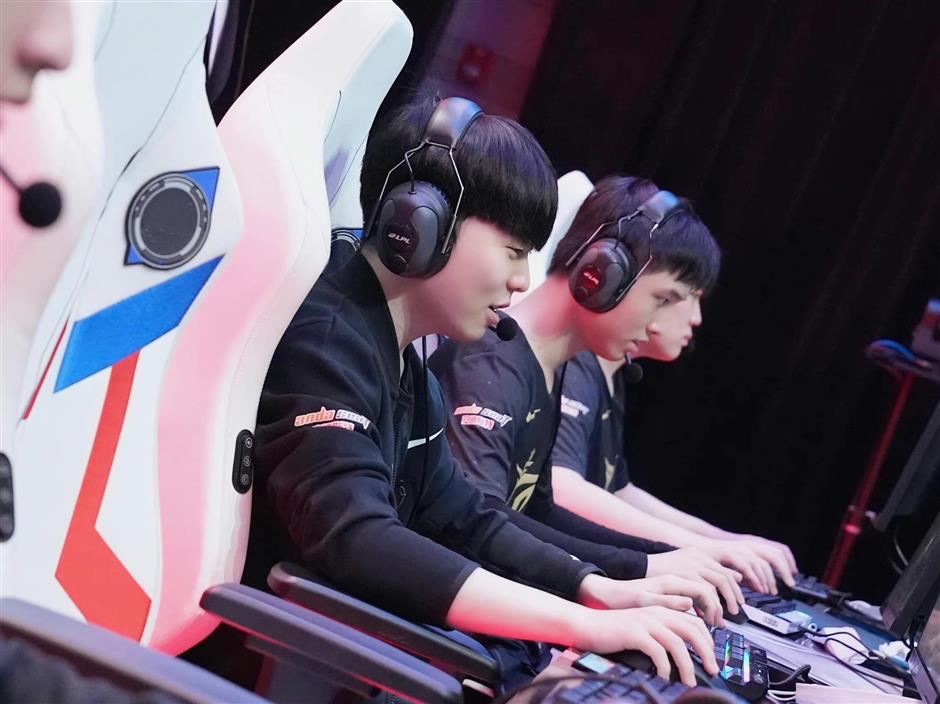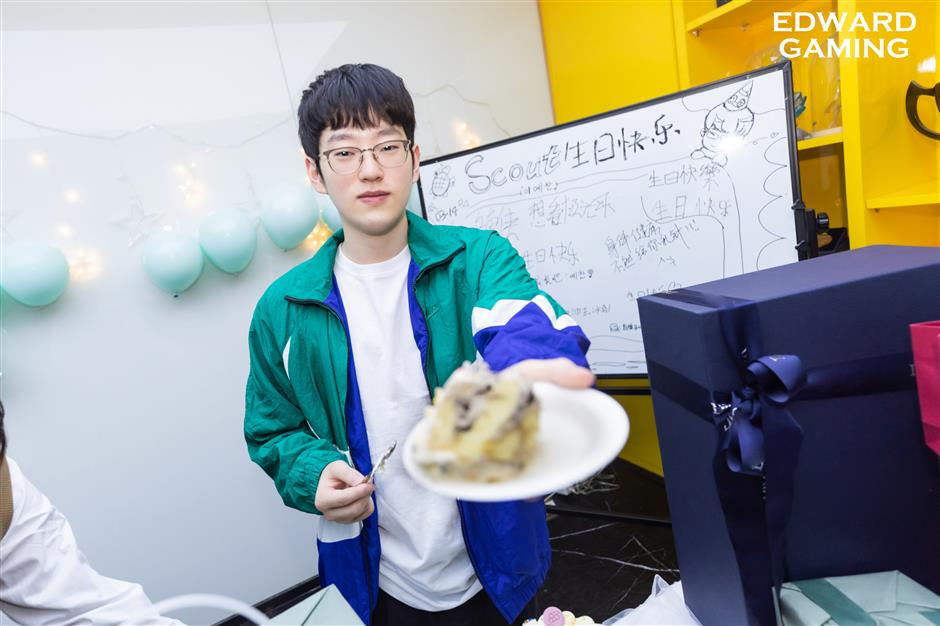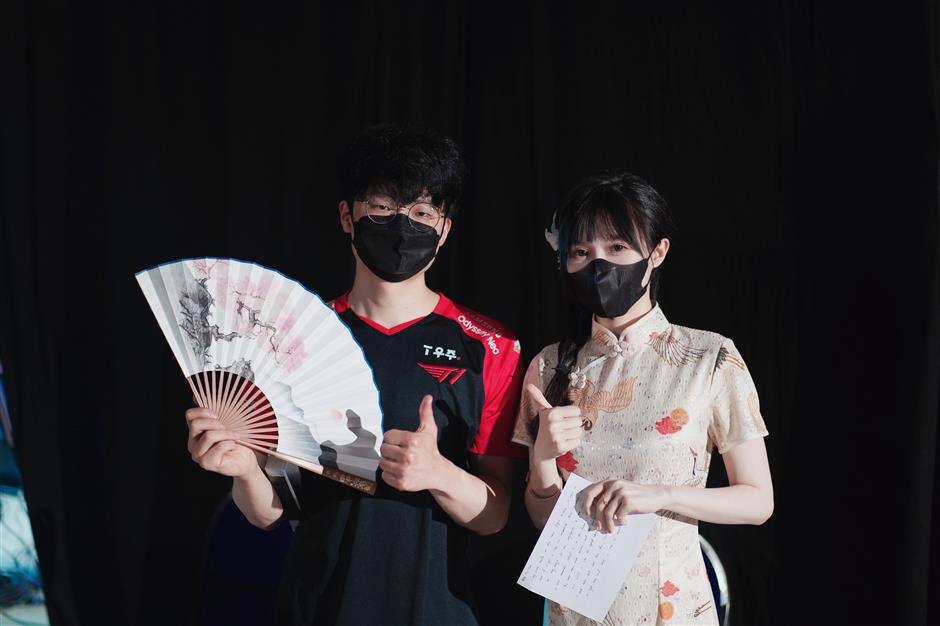Asia's top two eSports nations compete and intermingle

South Korean-born eSports player Lee "Scout" Ye-chan training with teammates.
South Korean-born eSports player Lee "Scout" Ye-chan, who won his first League of Legends world championship last year, fits right into Chinese eSports culture.
He shares a gourmet hotpot with teammates and answers interview questions in Chinese.
Born in 1998, Lee began his professional career in his native land, but was discouraged by his prospects for rapid advancement there. So he moved to China in 2016 and joined the Edward Gaming team.
Five years on, he is at the top of his game, helping his team to win the championship in League of Legends, a popular game with 600 million players worldwide. In the final match, he was chosen "the most valuable player."
"I have gotten used to the daily life in China," he told Shanghai Daily. "I like hotpot and I get along with everyone here."
South Korea and China are the two top eSports markets in Asia, and their similarities go beyond training tactics. Both countries have big pools of talent, huge fan bases and a good business environment for eSports to thrive.
Like soccer and basketball, eSports is a maturing segment of the broader athletics world, with global competition events, regional leagues and transfer seasons.
Lee is not alone in seeking fame in China. An increasing number of Korean professional players are exploring career opportunities here.
League of Legends, developed by Riot Games, is a multiplayer game with two teams of five players each. Each team occupies and defends their half of the map by controlling characters, with unique abilities and differing styles of play. Like basketball matches, a team usually fields five positions known as top laner, mid laner, jungler, bot laner and support.
According to Chinese league rules, each team can have a maximum of two foreign players.

Song "Rookie" Eui-jin (left) is ranked among the top five mid laners in China.
South Korea-born players stay in the Chinese league for 2.4 years on average, with some staying up to 7.5 years, according to Riot Games.
"We respect different customs and culture, and seek more common ground to create a warm and family-like working environment," according to the Edward Gaming team, which recruits Korean-speaking assistants and encourages foreign players to learn Chinese.
Song "Rookie" Eui-jin, a mid laner for the Victory 5 team, has been in the Chinese league for seven years.
Song, 25, along with Lee, is generally ranked as among top five mid laners in China. Though he's a relative newcomer to the Victory 5 team, Song quickly became a popular player.
"I have had a long journey in the Chinese league, and now I'm familiar with it," said Song.
Besides eSports skills and experience, he is considered the best Chinese-language speaker among Korean players. Some fans gently chide him for his northeastern accent.
Korean star players have excited and galvanized Chinese fans. On Weibo, Lee has 476,000 followers while Song has 3.7 million followers.
Some Korean players have Chinese girlfriends, with hints of possible marriage, industry insiders told Shanghai Daily.

Cake anyone? Lee celebrates his birthday in China.
Friendly matches are often organized among top Chinese and Korean top players, such as the classic strategy game WarCraft. They represent top professional levels in Asia and even worldwide.
In 2021, Asian eSports players comprised about 55 percent of the global player base. China's gaming market revenue hit US$45.6 billion to rank the No. 1 in the world, while South Korea ranked fourth with an income of US$7.1 billion.
The two gaming markets will continue rapid growth, at least until 2024, according to researcher Newzoo.
The affinity between both countries isn't surprising. South Korea and China share very similar cultures, according to Kim Seung-ho, consul general of the Republic of Korea in Shanghai.
According to the latest industry figures available, 31 Chinese games ranked among the most popular games in South Korea in the second quarter of 2021.
The rapidly growing popularity of eSports has received a big boost from mobile gaming.
In South Korea, mobile game revenue accounted for 57 percent of total gaming income in 2020, with a rapid growth rate of 40 percent, according to the Korean Creative Content Agency.
China, the world's biggest smartphone market, has similarly experienced rapid growth in mobile games, especially during coronavirus lockdowns, when people spent more time and money on digital entertainment.
A mobile version of the League of Legends game debuted in 2021.
In July, the Chinese team Nova eSports won the first global championship title in the mobile League of Legends Icons event, held in Singapore. It was the first major international eSports event attended by Chinese teams after the pandemic eased.
The Icons event, held between June and July, attracted 24 teams from around the world to compete for titles and prize money totaling US$2 million.

South Korean eSports player Jeong "Core" Yong-hoon poses with League of Legends commentator Michelle Yang with a Chinese-style fan.
Michelle Yang, a Chinese League of Legends game commentator, attended the Singapore event, where she interviewed global players.
"Chinese and Korean teams are the most serious and tenacious teams among all attendees," she told Shanghai Daily. "Now they represent the highest professional skill level on mobile League of Legends."
Such events highlight the surging popularity of eSports and mobile games in China and underpin Shanghai's ambition to become "a global eSports capital." In fact, many of China's top mobile game eSports teams are based in Shanghai.
China and South Korea are now exploring the new vanguard of the metaverse, the simulated three-dimensional digital environment using advance technologies.
In November, Seoul announced plans for an ecosystem called "Metaverse Seoul," with an initial investment of US$3.3 million. It covers development of virtual reality and collaboration to improve city services, planning, administration and support for virtual tourism.
Shanghai has drafted its own development blueprint, which will increase the value of the metaverse in the city to 350 billion yuan (US$54 billion) by 2025.
















